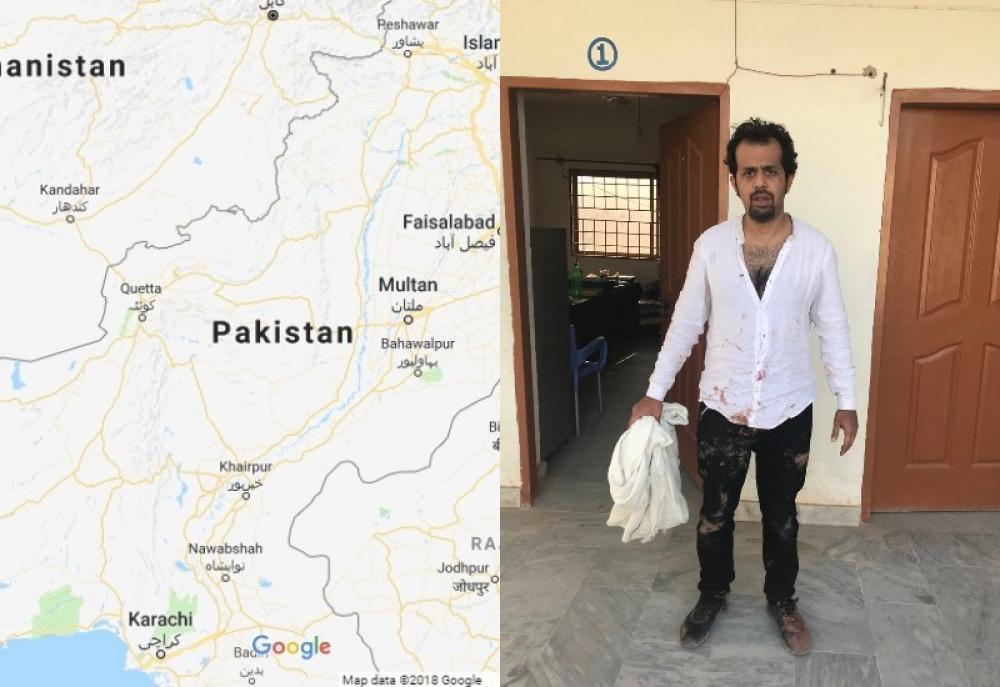Just Earth News | @justearthnews | 17 Jan 2018, 08:37 am Print

Islamabad: In the wake of Pakistani journalist Taha Siddiqui's attempted abduction by unknown assailants, senior Pakistani journalist Raza Rumi has urged Islamabad to take up the safety and security issues of scribes seriously.
Expressing concerns, Rumi has said that if Pakistan wants to get rid of its maligned international image, then it should start by ending 'this culture of impunity'.
In his op-ed for Daily Times, the senior Pakistani journalist wrote, "If the Pakistani state wants to increase citizen trust, create a tolerant society and improve its foreign ‘image’ – then ending this culture of impunity might be the first step. Otherwise we shall continue to hold that dreadful label as world’s most dangerous country for journalists."
Rumi also criticised the government inaction following Siddiqui's ordeal.
"It is not difficult to find out who these unknown attackers are. Technological tools are available but what is missing is the political will of the political elites who are afraid or, worse, indifferent. The Saleem Shahzad inquiry commission report had advised the government of the day to remedy the “systemic causes of tension between agencies and the media”. There was a long list of recommendations given but sadly nothing was implemented. Perhaps it is time to revisit these. Drafting new laws to protect journalists will do nothing if the executive authorities and the justice system will not discharge their mandates," he said.
On Jan 10, Siddiqui tweeted about the incident from a fellow journalist's account. "This is Taha Siddiqui (@TahaSSiddiqui) using Cyrils a/c. I was on my way to airport today at 8:20am whn 10-12 armed men stopped my cab & forcibly tried to abduct me. I managed to escape. Safe and with police now. Looking for support in any way possible #StopEnforcedDisappearances," he said.
This is Taha Siddiqui (@TahaSSiddiqui) using Cyrils a/c. I was on my way to airport today at 8:20am whn 10-12 armed men stopped my cab & forcibly tried to abduct me. I managed to escape. Safe and with police now. Looking for support in any way possible #StopEnforcedDisappearances
— cyril almeida (@cyalm) January 10, 2018
Siddiqui is WION's Pakistan bureau chief, who also reports for a host of foreign news outlets. He is a sharp critic of Islamabad, reporting on various internal issues, much to the latter's growing discomfort.
In the past, people like him, who have questioned Islamabad's motives on various burning issues, too have been picked and roughed up. The scenario is such in Pakistan, that many have been forced to leave the nation and settle abroad.
Raza Khan, a prominent activist, went missing from Lahore on Dec 2, 2017. Khan is a well known peace activist who has campaigned for a healthy India-Pakistan bilateral tie.
Ever since his disappearance, other activists have pointed fingers towards Pakistan's military intelligence agencies, allegations that have been downplayed by the latter.
Speaking about the incident, Atiqa Shahid, peace activist and Khan's close friend, told DW that she is concerned about her friend's safety.
"We're concerned about his safety," she said.
Journalism is not a crime.Journalist @TahaSSiddiqui telling about his abduction attempt in Islamabad pic.twitter.com/znDrlkT41v
— Hamid Mir (@HamidMirPAK) January 10, 2018
But Khan is not alone in the list. During the course of the year, three other prominent secular activists too went missing.
Salman Haider, a university professor, vanished from Islamabad in January, 2017.
Haider's absence was followed by the disappearances of three other activists, Waqas Goraya, Asim Saeed and Ahmed Raza. These have raised questions, is it a happenstance?
Maybe not. Speaking about the same, Rumi said, "In 2017, five bloggers and online activists were picked up, released after torture and no one knows who did it. It is painful to realise that people one has known over the years are now struggling to straighten their lives abroad. Another fearless reporter, Rana Tanveer, whose work on minorities brought him into much trouble, has also left the country and is facing major life upheaval. Some Pakistanis, especially those who question people’s patriotism, have no clue that living abroad is no proverbial bed of roses; particularly when you are engaged in meaningful work at home."
- Amid rising attacks on Hindus, Jamaat candidate Krishna Nandi promises ‘kith and kin’ treatment
- Fresh shock for minorities: Hindu youth burnt alive in Bangladesh
- More than 5,000 killed during massive crackdown launched on Iranian protesters, says human rights body
- Family alleges forcible disappearance of woman by Pakistani agencies
- Caught under wheels: Hindu man dies trying to stop fuel theft in Bangladesh





-1763561110.jpg)
